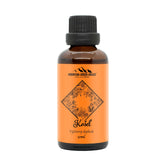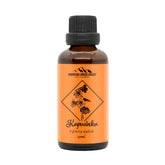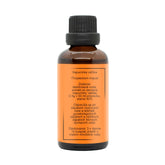Capsicum and its effects - do you know them all?
Capuchin effects
Greater nasturtium is a plant with a rich history of use in traditional medicine. Capuchin can be consumed in the form of tea, tincture , capsules or as an addition to meals.

A natural antibiotic
It is most often referred to as a natural antibiotic because its leaves, flowers and seeds are rich in various beneficial substances that act against bacteria, viruses and fungi. For example, nasturtium contains silymarin, which can help treat sinus infections. Silymarin is an antioxidant that has been shown to be effective in fighting bacterial and viral infections .
Capsicum also contains substances such as essential oil, silicic acid, flavonoids and other antioxidants that help strengthen the immune system and fight infections.
There are also several studies that confirm the effectiveness of nasturtium in the treatment of sinus infections . For example, one study found that patients who took capuchin extract experienced less sore throat and sought medical attention less often than patients who took a placebo.
Other effects of capuchin
The nasturtium herbal tincture is made from the buds, flowers, leaves and stems of this plant, which belongs to the nasturtium family. The tincture is mainly used as an antiseptic because it has strong bactericidal and fungicidal effects .
It can act against streptococci, staphylococci, e-coli and some types of salmonella . Antibacterial, antiviral and antibiotic substances contained in capuchin help with inflammations of the bladder, urinary tract, gynecological inflammations, discharges, flu, angina, colds, inflammations of the kidneys, upper respiratory tract. It also helps with sinus infections such as pharyngitis, otitis media.
External use of nasturtium
It is recommended for various skin diseases such as eczema, psoriasis, acne and nail infections . For acne problems, mix 1 teaspoon of the tincture and rub the affected areas with this solution.
Is it appropriate to combine cappuccino?
It is very effective in combination with other herbs to increase the effect. For example, a combination with calendula and chamomile can be helpful in treating sinus infections. The combination with echinacea can help strengthen the immune system.
Nasturtium - adverse effects
- Excessive fatigue: may have sedative effects, which may lead to excessive fatigue.
- Dizziness: may cause dizziness, especially in people with low blood pressure.
- Allergic reactions: Some people may be allergic to nasturtium, which can cause skin reactions, difficulty breathing, or anaphylactic shock.
- Drug Interactions: Capsicum may affect the effectiveness of certain medications, such as blood thinners, liver medications, diuretics, and cancer medications. It is important to consult with a specialist to avoid unwanted interactions if you are taking any of these medications.
- Pregnancy and breast-feeding: it should not be used during pregnancy and breast-feeding, as efficacy and safety have not been sufficiently established.
BUY TINCTURES
*The information provided on this website is for educational purposes only. None of the given information is intended as a substitute for a medical diagnosis and such information cannot be considered as medical advice or recommended treatment. This website does not support, endorse or advocate the use of narcotic or psychotropic substances or the commission of any other illegal activity.





